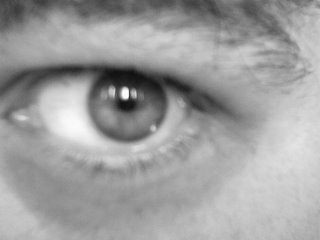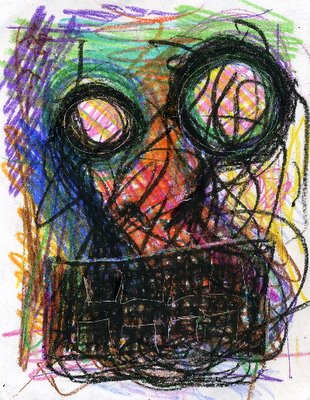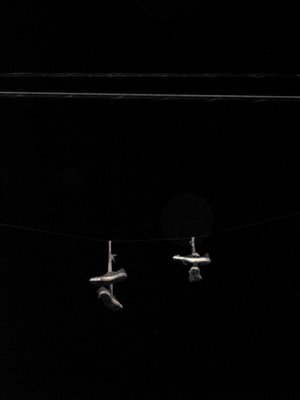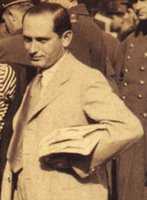
I saw
"Black Narcissus" (1947) last night at the Motion Picture Academy's Samuel Goldwyn Theater, the kick-off for a 100th birthday tribute (though he died at age 84) to British master director,
Michael Powell. The
tribute features a weekend of screenings of Powell's films.
An unexpected treat were video greetings from Martin Scorsese and Michael Powell's widow, Thelma Schoonmaker, Scorsese's long-time editor. Expressing their regret that they couldn't attend in person - they are cutting
"The Departed" - each gave a short tribute to Powell, Schoonmaker's concluding with obvious emotion. Schoonmaker met Michael Powell, in 1979, when Martin Scorsese invited his hero to New York during the cutting of
"Raging Bull" (1980). "Raging Bull" won Schoonmaker the Oscar for Best Editing.
I have seen "Black Narcissus" dozens of times. I first saw it on a VHS tape my dad had made from a copy he borrowed from his local library. My dad sent me dozens of these pirated VHS's in the years after I left college and it kept me immersed in movies that I, being young and of narrow taste, might not go out of my way to see. Now I am older and have broader, deeper, wider taste and there are still many movies I should see but might not go out of my way to see.
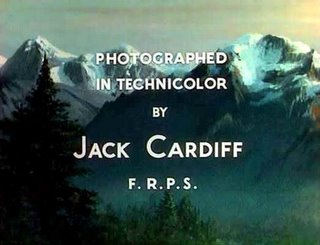
There was a discussion before the film with cinematographer / Technicolor titan,
Jack Cardiff, who is over 90 and has more energy and wit and good humor than I have - or could hope to. Film historian David Thomson moderated. Thomson was a friend of Michael Powell and responsible for setting the director up as Dartmouth's artist-in-residence in the 70's when Powell was suffering the obligatory British Genius Backlash, in which great British directors are forgotten for a decade or two before being praised to the skies again just before they die with everyone saying "Oh, I was always a fan of his. I'm surprised you've never heard of him. Have you seen 'Tales Of Hoffman'? Oh, you must. It is a masterpiece. It is exquisite. Yes, I'd like to think of him as my artistic spiritual godfather." Then you kick that person in the groin until they stop screaming.
After Sid Ganis, the new Academy President, gave a canned "Michael Powell, Michael Powell, Michael Powell" speech, Thomson got up to tell several moving stories about his acquaintanceship with the master, but he began his speech by mentioning - for the first time in the evening - Powell's partner,
Emeric Pressburger. I was the first audience member out of the gate to applaud. The man next to me kicked me in the groin until I stopped screaming.
Because we in America love the myth of individual success, and we treasure, above all things, the integrity & triumph of the individual human ego, we tend to make a single genius responsible for the excellence we see. We chase, drooling, the top supermodel, the top grossing movie, the top sports team, the top serial killer. Everyone else is an "also-ran". But Michael Powell and Emeric Pressburger were
partners on the Archers films. On over a dozen movies of the 40's and 50's the credit reads:
"Written, directed, and produced by Michael Powell and Emeric Pressburger". We are inclined to forget that. We should not.
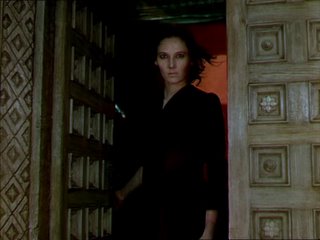
The first question Thomson asked Jack Cardiff was about the ins & outs of the Powell / Pressburger collaboration. Cardiff said they very much balanced each other with Michael Powell being the experimental, improvisational half of the partnership and Pressburger the down to earth, practical half. I was reminded of the David Lean / Robert Bolt collaborations. There the dividing line between director and writer was clearly drawn, but Lean was said to be the intuitive, emotional side of the partnership and Bolt the intellectual, theoretical side.
The screening was a digital projection of a digital restoration made from the "original" (I don't know if this means camera original) 3 black-and-white Technicolor strips (for a quickie tutorial on the Technicolor process go
here) and was the best version I have seen of the film to date, better than the Academy Film Archive photo-chemical restoration of a few years ago which was fine, but occasionally murky. The clarity of the image was such that one or two of the process shots showed their seams in a way that might have been disguised by a traditional print.

What I most enjoyed about seeing "Black Narcissus" on a large screen with such clear and clean projection was not that it was even more visually stunning - although that is true - but that I could enjoy the subtleties of the performances which are difficult to see on even a big-screen tv. Slight movements of the eyes describe gigantic internal character movements. A mild tightening of the lips reveals blazing internal shame. I found myself grinning widely, delighted by Deborah Kerr's giddy girlish grin as she begins to remember the locked away passions of her past. Moments between characters seemed magnified too and the sexual tension in scenes was far more taut than many 21st century films. In fact, this time around seeing the movie, I was shocked at how filthy and sordid it all is - all that sex. Sex, sex, sex. It's all about the sex, that picture. Digusting. And so, so wonderful. And what could be more sexy than Deborah Kerr, as a nun, trying day and night not to think about sex - trying not to even think about thinking about sex? Even better, Deborah Kerr, as a nun, trying day and night not to think about sex, while trying to get juicy Jean Simmons (who plays a convincing South Asian) to stop thinking about sex? At the same time, "Black Narcissus" is a deeply spiritual film and tackles the irreconcilable clash between desire and devotion head on.
A new Criterion Collection "Black Narcissus"
DVD came out a few years ago. I think it was made from the Academy restoration. I hope they reissue the film with this new, much better digital restoration.
Labels: media production, movies
 Styracosaurus, that spiky-necked glory of the Jurassic era, has garnered the top spot in our "Name Your Favorite Ceratopsian" poll, with mighty Triceratops a close second.
Styracosaurus, that spiky-necked glory of the Jurassic era, has garnered the top spot in our "Name Your Favorite Ceratopsian" poll, with mighty Triceratops a close second.





